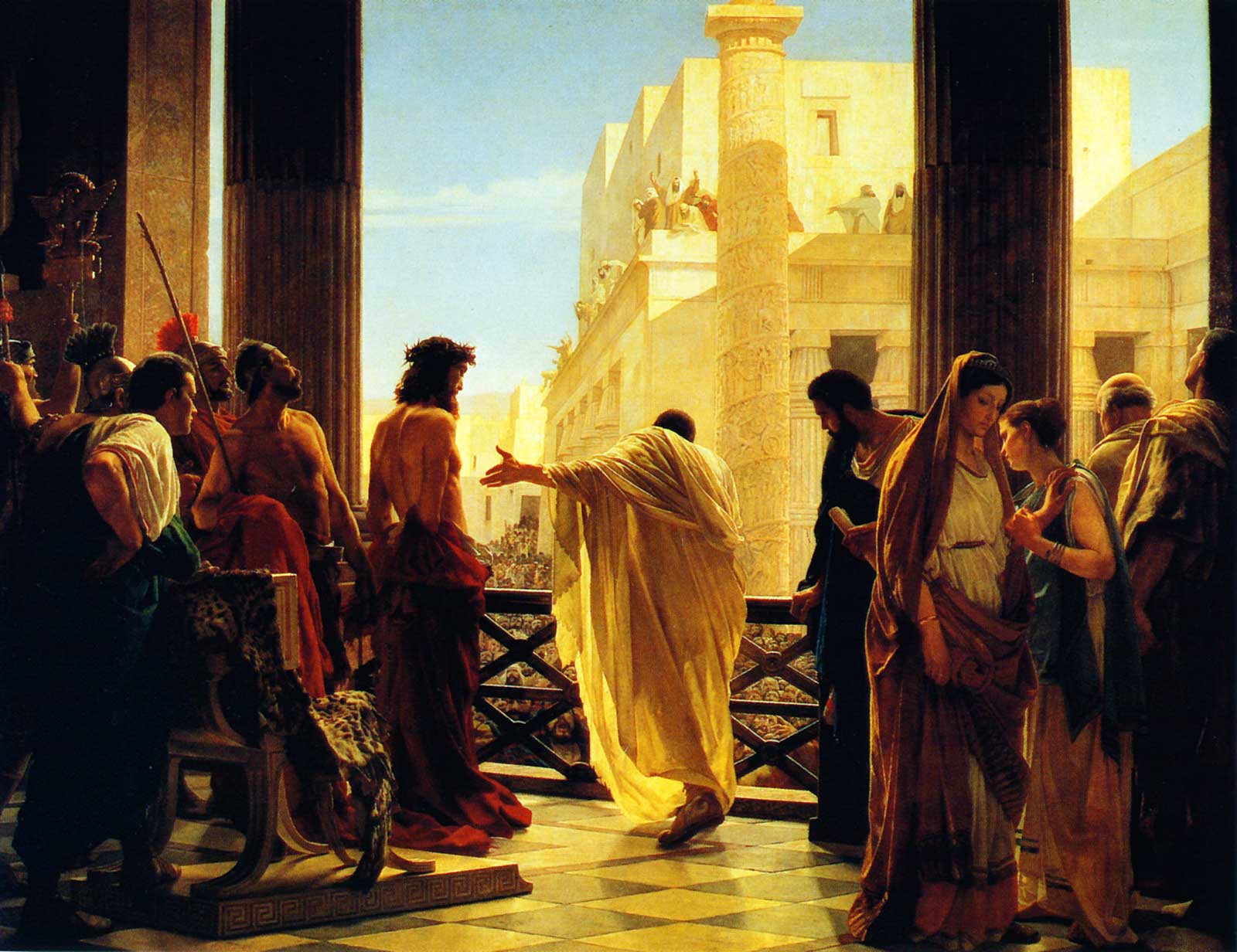What is Truth?
Of all the supporting cast in the New Testament, I think Pontius Pilate is probably my favorite. We know little about him, of course, but it is interesting to speculate. If one wants to imagine what Pilate was like "off duty," then I think that perhaps the most revealing thing he said during the trial is the cynical question he posed to Jesus in John 18:38: "What is truth?"
Despite this callous remark, Pilate unhesitatingly told the Jews that "I find in him no fault at all." But when the Jewish mob agreed to take responsibility for Jesus' death, Pilate acquiesced, perhaps believing that "it was expedient that one man should die for the people," (John 18:14) rather than risking a bloody riot. Ironically, while the Jewish crowd, schooled in tradition and well aware of the words of the prophets, failed to recognize their Messiah, the Romans on the scene were less blind. (See John 19:19-22 and Mark 15:39)
 |
| I find no fault in this man... |
It seems to me that in the final analysis, Pilate realized that the truth did not matter to the mob, and rather than give them justice, he granted them what they desired. Perhaps this prompted his cynical query and his equally cynical treatment of the Jewish authorities after the crucifixion. His cynicism seems justified when the priests later stage a cover-up of Jesus' resurrection. What is truth, indeed?
Regrettably, I feel I have to sympathize with Pilate. As a journalist, the truth is important to me. Yet today, I sense that the crowd is not interested in the truth, only in what they want to hear. I live in a democratic society, after all, and democracies tend to devolve into mobs. Like the one before Pilate, the mob today is only interested in appeasing its own wants. The truth is irrelevant because it does not satisfy those wants. Instead, it becomes replaced by pundits and opinion pieces and columnists and studies telling people what they want to hear. Why? Because in a democratic society, telling people what they want to hear works.
For instance, one frequently hears people, especially conservatives, decrying the bias and incompetence of the media and blaming it for various ills, accusing it of "manipulating facts" and distorting people's views. The truth is that the media rarely changes people's perspectives (the recent acquittal of Zimmerman, despite the poltergeist of racism raised by the media, can attest to this fact) and in today's pundit-filled world, I suspect people are most likely to pick and choose the mouthpieces that reenforce their preexisting views. But it is more convenient to accuse the "liberal media" of "brainwashing America" than it is to conclude that the liberal media is merely a Pilate before the mob, producing what sells. To come to this conclusion would be to undermine the fundamental notions of our modern democratic beliefs, the beliefs that the common man is decent and smart and knows what is right and will vote accordingly, as long as he is not lied to by the television. To hold any beliefs to the contrary is to imply that we, not them, are to blame for the problems. And (heaven forbid) it might even imply that democracy doesn't work, and that is unthinkable.
Along with the media, "corrupt politicians" and "the president" as long as he is on the opposing side of the two-party divide, are also held equally accountable for the "mess America is in." Actually, they are blamed for the mess, but not held accountable. They are instead reelected, or they are shuffled out and other political puppets are put in place.
Perhaps the truth is that deep down, we Americans like being lied to by those in power because, like Pilate, we feel we can wash our hands of the guilt. But those in Congress, you will notice, blame the President with appalling frequency while letting more power slide into his hands. What little power Congress retains appears to exist merely to allow the President to blame his failures on them.
 |
| "As nations cannot be rewarded or punished in the next world they must be in this." -George Mason |
Perhaps the truth is that those in Congress want the president to have more power so that he, like a lightning rod, will attract the wrath of the people once his eight years are up and they will be unscathed.
 |
| "It is expedient that one man should die for the people..." |
Perhaps the truth is, that like any mob, our impatient desires and thoughtless attitude render us unfit for governance. We call upon our Pontius Pilates to release our Barabbas and then are shocked when we find who is crucified. Too late we realize that the blood is on our hands and on the hands of our children forever, and Pilate's guilt is ignorable compared to the massive weight of our own.
 |
| "He that delivered me unto you hath the greater sin." |
No comments:
Post a Comment